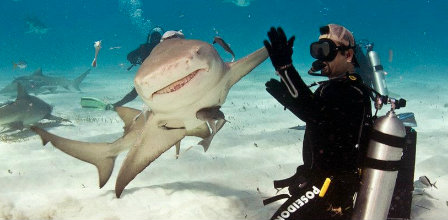- Sections :
- Crime & Public Safety
- Restaurants & Food
- Sports
- More
Categories
Shark diver, photographer offers himself up to further shark conservation

THE WOODLANDS, Texas -- For the 26th year in a row as television viewers sink into the sofa, they’ll sink their teeth into a full week of programming on the Discovery Channel popularly known as “Shark Week.” Ever since the blockbuster movie, “Jaws,” the 1975 American thriller directed by Steven Spielberg and based on Peter Benchley's novel by the same name, the public’s fascination with sharks has never waned. In fact, based on the made-for-TV movies, “Dynoshark” and “Sharknado,” which recently aired on the SyFy channel, it appears to be intensifying. The latter created such a sensation on Twitter, that it was in theaters for one night only. What the majority of people know about sharks is what has erroneously been spoon-fed to them by Hollywood.
The Shark Research Institute (SRI) is a multi-disciplinary 501(c)3, non-profit organization, created in 1991, to research and promote the conservation of sharks and to educate the public with authoritative information. To fund their efforts, SRI hosts an annual fundraiser on the heels of the Discovery Channel’s “Shark Week.” The highlight of their fundraiser will be a shark celebrity auction which will span ten days, August 9 through 18. Individuals who have distinguished themselves as the most knowledgeable sources on sharks and advocates for their conservation will be auctioned off. Paul Spielvogel of The Woodlands will be one of celebrities in the online auction.
Shark diver and acclaimed sea life photographer, Paul Spielvogel, has dispelled many of the movie myths. A real estate attorney and escrow officer for American Title Company in The Woodlands by day, and a shark photographer enthusiast in his free time, produced the most widely syndicated photo of a shark and diver interaction; a photo of the editor of “Shark Diver” magazine, Eli Martinez, exchanging a ‘High Five’ with a shark, pictured above. Spielvogel maintains that his photography speaks for the sharks, and shows them to be more respectful of the human species than we are with them.
Like their teeth, Spielvogel states that their senses are so sharp that they know the difference between the normal diet and human flesh. Thus the reason humans aren’t devoured when attacked by sharks. Wounded, maimed, disfigured, and dismembered maybe, but not consumed.
Spielvogel maintains that the shark isn’t the predator…it’s man. An estimated 73 million sharks are mutilated annually for shark fin soup, considered a delicacy in Asian restaurants around the globe. After the sharks are ‘de-finned,’ the carcasses are thrown overboard trashing the ocean. As a result of SRI’s shark conservation efforts, the state of New York has passed legislation to ban the ‘finning’ of sharks, effective July 1, 2014, joining California and other west coast states.
“Sharks are the oceans’ clean-up crew,” said Spielvogel. “Eliminating the ocean’s best scavengers leaves just the crabs, and there just aren’t enough crabs to clean up the millions of carcasses that litter the ocean floor. Sharks are a vital part of the ocean’s ecosystem. The annihilation of sharks will radically affect oceanic balance,” added Spielvogel.
Spielvogel maintains that sharks have been grossly maligned. To learn more about the behavior of some of the different species of shark, read the previous Woodlands Online article Local shark diver, photographer gives insight into sharks.
In all, the number of shark species is one shy of five dozen. To access a comprehensive listing compiled by SRI, go to Shark Species. Those who serve to benefit from the research funded as a result of fundraisers like the celebrity auction include the scientific community, marine resource users, subsistence fishermen, organizations and individuals concerned with maintaining a healthy marine ecosystem, and the dive tourism industry of which Spielvogel is an ardent participant.
“I love being with the sharks and being a part of their conservation,” said Spielvogel. “I’m always on a mission to get the next great shark/diver photo. I’m always chasing the shot.”
Visual and satellite tracking enables shark behaviorists and Spielvogel to locate the sharks for study and photographing; funding is required for this effort. The funding also provides DNA studies, environmental advocacy, and public education. The Shark Research Institute and Paul Spielvogel are making significant contributions to shark conservation, but contributions from the public are essential to further their efforts. To donate to shark conservation, bid in the auction, or adopt a shark, visit the SRI website The Shark Research Institute.
The Shark Research Institute (SRI) is a multi-disciplinary 501(c)3, non-profit organization, created in 1991, to research and promote the conservation of sharks and to educate the public with authoritative information. To fund their efforts, SRI hosts an annual fundraiser on the heels of the Discovery Channel’s “Shark Week.” The highlight of their fundraiser will be a shark celebrity auction which will span ten days, August 9 through 18. Individuals who have distinguished themselves as the most knowledgeable sources on sharks and advocates for their conservation will be auctioned off. Paul Spielvogel of The Woodlands will be one of celebrities in the online auction.
Shark diver and acclaimed sea life photographer, Paul Spielvogel, has dispelled many of the movie myths. A real estate attorney and escrow officer for American Title Company in The Woodlands by day, and a shark photographer enthusiast in his free time, produced the most widely syndicated photo of a shark and diver interaction; a photo of the editor of “Shark Diver” magazine, Eli Martinez, exchanging a ‘High Five’ with a shark, pictured above. Spielvogel maintains that his photography speaks for the sharks, and shows them to be more respectful of the human species than we are with them.
Like their teeth, Spielvogel states that their senses are so sharp that they know the difference between the normal diet and human flesh. Thus the reason humans aren’t devoured when attacked by sharks. Wounded, maimed, disfigured, and dismembered maybe, but not consumed.
Spielvogel maintains that the shark isn’t the predator…it’s man. An estimated 73 million sharks are mutilated annually for shark fin soup, considered a delicacy in Asian restaurants around the globe. After the sharks are ‘de-finned,’ the carcasses are thrown overboard trashing the ocean. As a result of SRI’s shark conservation efforts, the state of New York has passed legislation to ban the ‘finning’ of sharks, effective July 1, 2014, joining California and other west coast states.
“Sharks are the oceans’ clean-up crew,” said Spielvogel. “Eliminating the ocean’s best scavengers leaves just the crabs, and there just aren’t enough crabs to clean up the millions of carcasses that litter the ocean floor. Sharks are a vital part of the ocean’s ecosystem. The annihilation of sharks will radically affect oceanic balance,” added Spielvogel.
Spielvogel maintains that sharks have been grossly maligned. To learn more about the behavior of some of the different species of shark, read the previous Woodlands Online article Local shark diver, photographer gives insight into sharks.
In all, the number of shark species is one shy of five dozen. To access a comprehensive listing compiled by SRI, go to Shark Species. Those who serve to benefit from the research funded as a result of fundraisers like the celebrity auction include the scientific community, marine resource users, subsistence fishermen, organizations and individuals concerned with maintaining a healthy marine ecosystem, and the dive tourism industry of which Spielvogel is an ardent participant.
“I love being with the sharks and being a part of their conservation,” said Spielvogel. “I’m always on a mission to get the next great shark/diver photo. I’m always chasing the shot.”
Visual and satellite tracking enables shark behaviorists and Spielvogel to locate the sharks for study and photographing; funding is required for this effort. The funding also provides DNA studies, environmental advocacy, and public education. The Shark Research Institute and Paul Spielvogel are making significant contributions to shark conservation, but contributions from the public are essential to further their efforts. To donate to shark conservation, bid in the auction, or adopt a shark, visit the SRI website The Shark Research Institute.
Comments •

















